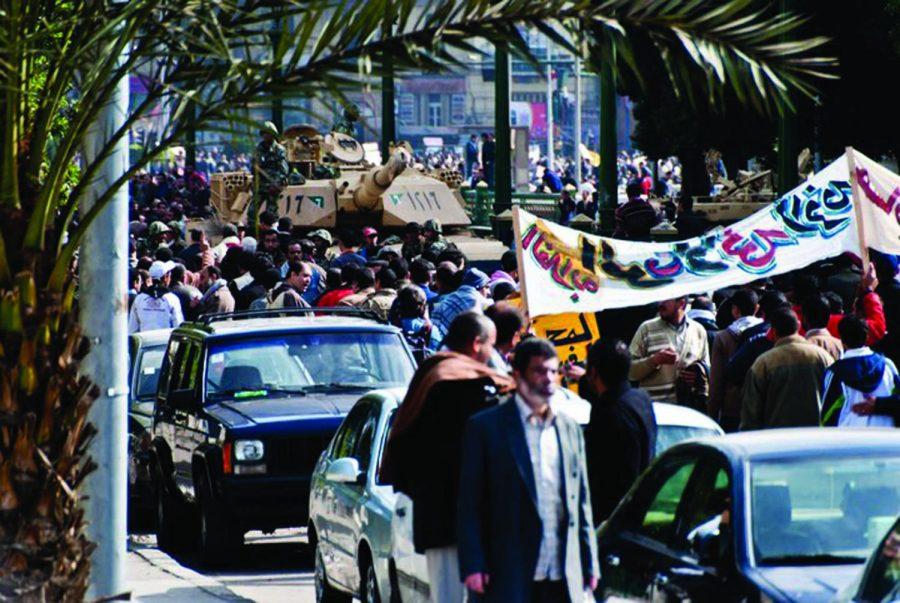Egyptian protests hit home for North African students
February 10, 2011
Demonstrators gathered at the intersection of Whitesburg Drive and Airport Road in Huntsville last Saturday in a show of support for the protestors in Egypt, holding signs that said “Stop the Massacre in Egypt” and “Mubarak is a Dictator.”
On the same day, the U.S. officially backed a compromise that advocated a gradual transition of power rather than the immediate removal of President Hosni Mubarak. That’s the kind of approach the protestors in Egypt’s Tahrir Square don’t want, and that sentiment was echoed in Huntsville as Arab-Americans and American-born citizens chanted “Heave! Ho! Mubarak must go!” and “Free Egypt!” in unison.
The event, organized by the Huntsville Islamic Center and the Alabama Peace Network, was intended to demonstrate the participants’ solidarity with the protestors in Egypt and create awareness of the reasons why Mubarak’s removal is important to them. It was ended prematurely, however, when the police arrived in response to complaints from local businesses.
Everyone dispersed calmly, but confrontations between demonstrators and police in Tahrir Square haven’t been so civil, with clashes resulting in clouds of tear gas and volleys of rocks and bottles.
UNA student Cheri Kamel has family members living close to Tahrir Square. Two of her cousins were involved in the demonstrations Jan. 25, the “Day of Wrath,” that started it all. One of them was affected by tear gas shot into the crowds.
“It’s hard not being able to be there with my family,” Kamel said. “The scariest thing was when [the government] dropped communications and we couldn’t get in touch with them for a while.”
Kamel was born in Egypt and spent most of her high school years there, attending the American International School in Egypt, where she had a class with Mubarak’s niece. Her father is Egyptian and her mother is American. They both live in Alabama now, and her father sends money to their family in Egypt.
“If it weren’t for my dad having an American job, I don’t know what they would do,” she said. “My uncle makes about $20 a month. The prices have gotten high, but the pay hasn’t gone up. More and more people are living in poverty.”
In addition to political motivations, economic unrest has played a major role in catalyzing the protests. Yassine Zizi, a UNA student from Morocco, went to Egypt one month for vacation and witnessed how desperate many people were just to make ends meet.
“I could immediately see a difference between my country and Egypt,” he said. “There you could find a doctor in a hospital who also drives a taxi.”
Zizi believes that if Mubarak leaves it may help the country economically in the long run, but his replacement may not be good for the country politically, especially in its relations with Israel.
“Mubarak has been good at keeping the peace with Israel because it’s strategic and he comes from a military background,” he said. “I don’t think [the U.S.] should call for Mubarak to leave right now. They should help him manage the economy and then we’ll see what else can be done.”
Mubarak came into office in 1981, after the assassination of Anwar Al-Sadat, who signed a peace treaty with Israel. As a reward for this, Egypt has received more than $1.3 billion of U.S. aid annually, most of which has been allocated to the military.
Though the protests are largely secular in nature, one concern is that religious extremists like the Muslim Brotherhood, long suppressed in Egypt, may come to power, rolling back the religious freedoms that characterize the country and possibly resulting in an alliance with anti-Israeli governments.
“I really don’t think the Muslim Brotherhood could gain a foothold,” said Kamel. “For Egyptians, it’s not about that right now.”
Dr. Leah Graham, assistant professor of political science, believes that the fear that the Muslim Brotherhood could come to power bears similarities to the Cold War, during which it was often assumed that any political unrest would lead to a Communist revolution.
“There is always an element of uncertainty during any regime change,” she said. “There may be some temporary instability, but in a few years the status quo will prevail.”
According to Graham, religious extremism is forged in totalitarian states because mosques act as a sanctuary for free speech when no other place provides for it, and in a functioning democracy, radicalism will moderate.
The Obama administration has taken a middle-of-the-road approach so far, trying to satisfy the demonstrators’ demands for democracy and preserve the U.S.’s strategic alliances in the region.
Graham believes that if the U.S. is to adhere to its mission of promoting democracy, the government should support the protestors, and that the kind of constitutional restraints placed on the new government will ultimately be more important than who is in power.












